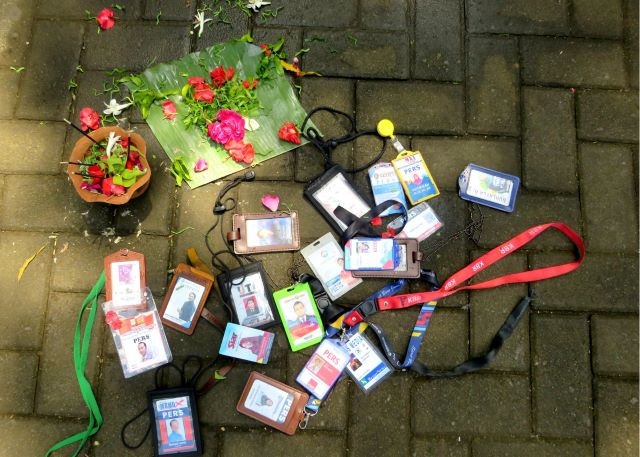Balinese women make breakthrough
The Grand Council of Customary Villages (MUDP), a powerful body in Balinese society, made a gigantic breakthrough in the island’s centuries-old paternalistic customary laws
Change Size

T
he Grand Council of Customary Villages (MUDP), a powerful body in Balinese society, made a gigantic breakthrough in the island’s centuries-old paternalistic customary laws.
It has openly acknowledged the rights of women to inherit family property; entitlement rights to children’s custody; and rights to obtain marital assets.
These decisions were announced during the annual meeting of the council on Monday, which also discussed and revised the outdated customary laws.
Prominent activist Luh Putu Anggraeni warmly welcomed the revisions, saying, “After 110 years of struggling for their rights, Balinese women finally have gained their proper place within their own families.”
For hundreds of years, the Balinese Hindu society adopted a customary law, which placed male heirs as the guardians of families’ assets. According to this law, only male children were entitled to their parents’ tangible and intangible assets. Traditionally, the oldest son became the patriach of the family, who took care of everything including funding rituals, social affairs and others. Younger brothers had less social and family responsibilities.
Meanwhile, female children were not entitled to any of the families’ assets or rights to voice their aspirations. Balinese wives were also denied her husbands’ assets and custody of their children when their husbands died or if they got divorced.
In both families and Balinese society, women have had to accept any decisions made by men.
However, the customary council eased this regulation by allowing women to become its members as of 2004. There are now seven female members of the council, including Putu Anggraeni.
Under one of the council’s new decisions, female children are entitled to family assets. When women get married they are now entitled to half the amount of their parent’s assets that their brothers are entitled to. A girl who marries a man of another faith and converts to her husband’s faith may still be given her parents’ property as a marital gift.
In married life, the council also stipulates that both husbands and wives have equal rights to marital assets, as long as they are still a couple.
The council also says women now have rights to raise children independently, under certain circumstances.
Traditionally, Balinese women lost their rights to children when their husbands died or if they got divorced. Rights to take care of children would then automatically go to the husband or his family.
According to Putu Anggraeni, herself a lawyer, many women had difficulties during family disputes such as divorce.
“The existing regulations are seemingly against women’s interests. We need more women-friendly and fair regulations,” she said.
Wayan P. Windia, a professor of customary law at Udayana University in Denpasar, said the new regulation was a long-awaited reform of Balinese customary law.
“We want to see the customary law become a more humanized and civilized law. The last time Bali revamped the law was around 110 years ago,” the professor said.
The professor went on to say that basically it was Balinese women who took care of their parents when they were aging. “Many women also take on family responsibilities,” he said.
It would take a lot of work and effort to synchronize Balinese traditional laws with national laws, he said. “A lack of understanding of customary laws in Bali has led to many different decisions being made by customary councils and the national legal institutions,” he said.
The council’s new verdict on women’s rights will soon be distributed to 5,000 village councils across Bali.









